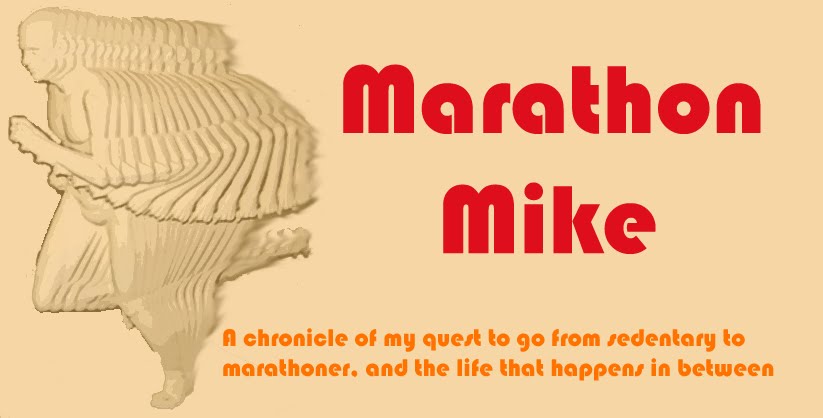Time for shop talk. Warning, when I use the preceding phrase, that means that I'm going to be talking about my bread and butter, my long-time mistress and first love, Philosophy. I was trying to keep it away from my blogging, and it's funny that it was when I mad that decision, that was about the time that I stopped blogging with any frequency. Funny how that happens, huh? Well as you can see, I have decided to abandon that rather meaningless policy and throw my ideas out there so that they will be etched in the digital stone that is the world wide web, and not on a flimsy piece of paper in the drawer of my desk that my fabulous lady Erin is currently whispering that I get rid of (okay, I concede that it is made of plywood...plywood and memories). However, though I will be intermittently wrestling with issues philosophical/theoretical on this blog, there are two things that will remain constant (so help me Plato):
1) I will still be writing about pushing myself in running toward a marathon and in being a grown-up man.
2) I will keep my posts accessible. Though I may engage in "shop talk" (which will also be the corresponding tag for posts of a philosophical bent), I will not be esoteric or overly technical. Anything that took me more than a few sentences of explanation to learn as an undergrad, I will explain briefly.
That stuff now out of the way, off I go!
Yesterday, in Metaphysics class, my professor was talking about the A-theory and B-theory of time. There are many complications, but the main difference can be laid out thusly (and arguments extrapolated from what each statement implies):
A-series - There is a past, present, and future. Each event goes from being the future, to presently happening, and then becoming past.
B-series - The A-series makes no sense. Time is a dimension like space, laid out in a certain way. Terms like "now" or "the present" are simply indexicals (like "I", where the meaning changes based on the conditions under which the word is uttered), and events are merely earlier than, later than, or concurrent with some arbitrarily chosen point in time.
Now, the big issue between the two, and between several different A-theorists, is that it seems that when we experience things, we seem to have, as part of the content "now". Let me explain. Let's say I'm in pain, I have a monstrous toothache. The content of my experience is "tooth in pain" or something like that. But the A-theorist says that in addition to that, we have a "nowness" that attaches to that experience. The B-theorist, it seems can't account for that, because all of time is on an equal plane, there is no "now" that is priveleged, and it certainly can't be part of an experience. I find that utterly convincing. There's more jargon to the argument, involving propositions, truthmakers, etc, but I am truly convinced by it.
I really only bring that up as a segue into a larger theme of my learned life. From my first Philosophy of Mind class as an undergrad, I've always had problems with certain philosophical doctrines. With ethics and Moral Philosophy, it's easy to see the root of any aversions one might have with a theory, because there are certain moral intuitions and value judgments that people bring with them to any philosophical debate. But things get murkier when you're discussing metaphysics. After all, the main question of metaphysics is "what is reality like?". And if you're doing metaphysics, and you make claims to describe reality, another metaphysician will no doubt ask you the above question, but without the last word. That question, the more basic one, is the ontological question. It is the question that W.V.O. Quine made philosophers focus on midway through the 20th century: "what is there? what exists?". This question can be asked more technically, in a sense, by asking "what do your quantifiers range over?". I have always been inclined to answer these questions by saying "only concrete particulars exist, my quantifiers ranger over only concrete particulars, that's all that there is". I thought that this was the bedrock of my metaphysical theorizing, and it led me to some pretty dismissive attitudes in metaphysical talks. It would go something like this:
Philosopher A: Properties?
Me: Nope
Philosopher A: Propositions?
Me: No way.
Philosopher A: Concrete possible worlds?
Me: Uh-uh.
Philosopher A: Abstract possible worlds?
Me: Not a chance [there's a hidden philosophy joke there]
Philosopher A: Numbers? Sets?
Me: Null. [also a hidden joke]
You get the idea. I however, did not really look at that until recently, when we were discussing Presentism. That is the doctrine that the only things that exist are the things in the present moment, or more succinctly, to exist is to be in the present. This means that there are no things in the past, and there is no future to which to travel at a faster rate than time moves. But my inclination to this view enlightened me regarding my most basic ontological attitude: keep it simple! I am concerned with keeping the leanest ontology possible. This means that even with regards to time, I operate with the least amount of existing entities. This gives me, in a sense, a new foundation from which to build my philosophical house. It also gives me something to fight for in the "field" that I have chosen. I fight for parsimony, I fight for simplicity. Maybe it's an extension of my laziness, but I think I can live with that, so long as "laziness" is not an abstract property.
Subscribe to:
Post Comments (Atom)


I like when you blog. I don't care what you blog about, but when you blog about Philosophy it just reminds me how smart you are.
ReplyDelete